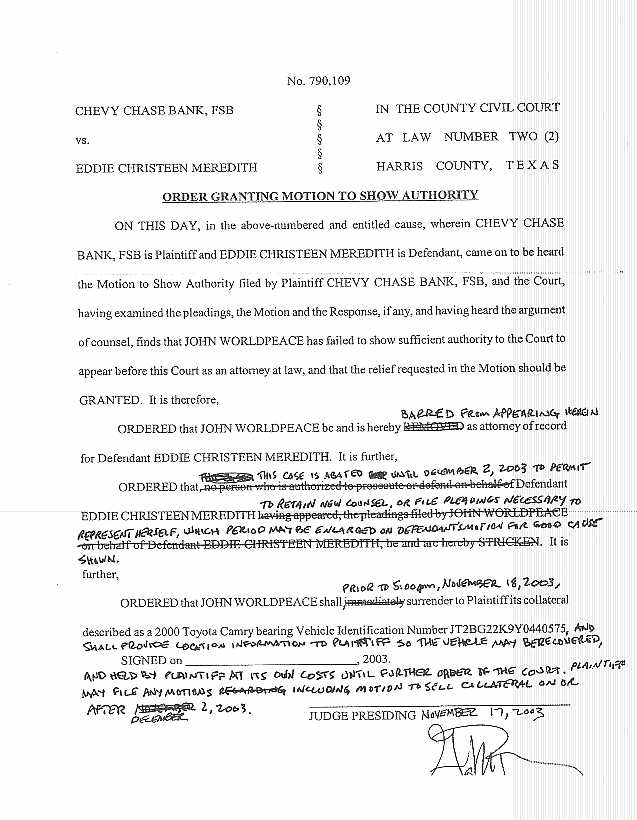
NO. 2002-42081
COMMISSION FOR
LAWYER
§
IN THE DISTRICT COURT
DISCIPLINE
§
§
V.
§
§
JOHN WORLDPEACE
§
269TH JUDICIAL DISTRICT
WORLDPEACE’S DEMAND FOR JUDGE FRY TO
SET ASIDE HIS INTERLOCUTORY
TO
THE HONORABLE JUDGE OF SAID COURT
COMES NOW, WorldPeace, Respondent in the above styled and numbered cause,
and files this WORLDPEACE’S
DEMAND FOR JUDGE FRY TO SET ASIDE HIS INTERLOCUTORY
SUMMARY
Judge Fry has intentionally, knowingly and maliciously caused a defacto disbarment of WorldPeace by signing and entering his
Judge Fry has been informed that the Judgment for Disbarment has created
confusion among the judges of Harris County, Texas, the majority of whom have
decided not to allow WorldPeace to practice in their courts because the
August 27, 2003, Judgment for Disbarment appears on its face to be valid and
therefore will require an order from Judge Fry setting aside or modifying the
Judgment for Disbarment or an order from the Appellate Court or the Supreme Court vacating the order.
Further, per Judge Hellums, the State Bar is calling the local courts
telling the judges of Harris County that WorldPeace is disbarred knowing the
Judgment for Disbarment is interlocutory. This is a bad faith and corrupt action by the State Bar that is
supported by Judge Fry’s refusal to set aside the August 27, 2003, Judgment
for Disbarment.
AUTHORITIES
“In
Lehmann, we held that a judgment is final for purposes of appeal in
circumstances like those of this case “If and only if either it actually
disposes of all claims and parties then before the court, or it states with
unmistakable clarity that it is a final judgment.
Id at 192. We apply this rule
to the present case.
As we held in Lehmann, “Mother Hubbard” language like that contained
in the July 9 summary judgment does not indicate finality.
Guajardo
v. Conwell; 46 S.W. 3d 862, 863-4 (
“We
no longer believe that a Mother Hubbard clause in an order or in a judgment
issued without a full trial can be taken to indicate finality.
We therefore hold that in cases in which only one final and appealable
judgment can be rendered, a judgment issued without a conventional trial is
final for purposes of appeal if and only if either it actually disposes of all
claims and parties then before the court, regardless of its language, or it
states with unmistakable clarity that it is a final judgment as to all claims
and all parties.”
Lehmann
v. Har-Con Corp.; 39 S.W. 3d 191, 192-3 (
The
inclusion of a Mother Hubbard clause does not indicate that a judgment rendered
without a conventional trial is final for purposes of appeal. Lehmann v. Har-Con
Corporation, 39 S.W.3d 191 (Tex.2001).
When there has not been a conventional trial on the merits, an order or judgment
is not final for purposes of appeal unless it actually disposes of every pending
claim and party or unless it clearly and unequivocally states that it finally
disposes of all claims and all parties. Lehmann v. Har-Con Corporation, supra.
The trial court stated in its October 28 order that it was addressing the
parties' motions for partial summary judgment. The order states that the Gibsons
take nothing on their claim against Sabre for oil and gas lease termination;
however, the order does not reference
the Gibsons' other claims against Sabre. We find that the October 28 order does
not clearly and unequivocally state that it disposes of all claims and parties.
Sabre
v. Gibson; 72 S.W. 3d 812, (
An order or judgment is not final for purposes of
appeal unless it actually disposes of every pending claim and party or unless it
clearly and unequivocally states that it finally disposes of all claims and all
parties.
Lehman v. Har-Con Corp., 39 S.W.3d 191, 205 (
Espeche
v. Ritzell, 65 S.W. 3d 226, 232 (
In
these two consolidated cases we revisit the persistent problem of determining
when a judgment rendered without a conventional trial on the merits is final for
purposes of appeal. We consider only cases in which one final and appealable
judgment can be rendered and not cases, like some probate and receivership
proceedings, in which multiple judgments final for purposes of appeal can be
rendered on certain discrete issues.1
And we consider a judgment's finality only for purposes of appeal and not for
other purposes, such as issue and claim preclusion.2
In Mafrige v. Ross,3 we held
that a summary judgment is final if it contains language purporting to dispose
of all claims and parties. We gave as one example of such language what we have
called a "Mother Hubbard" clause4
-- a recitation that all relief not expressly granted is denied.5
Since then, the routine inclusion of this general statement in otherwise plainly
interlocutory orders and its ambiguity in many contexts have rendered it inapt
for determining finality when there has not been a conventional trial. We
no longer believe that a Mother Hubbard clause in an order or in a judgment
issued without a full trial can be taken to indicate finality. We therefore hold
that in cases in which only one final and appealable judgment can be rendered, a
judgment issued without a conventional trial is final for purposes of appeal if
and only if either it actually disposes of all claims and parties then before
the court, regardless of its language, or it states with unmistakable clarity
that it is a final judgment as to all claims and all parties. In the two
cases before us, the court of appeals concluded that judgments that do not meet
this test were final and dismissed the appeals as having been untimely
perfected.6 We reverse and
remand for consideration of the merits of the appeals.
When a court grants more relief than requested, the
judgment is reversible but the error does not deprive this court of jurisdiction.
Lehmann v. Har-Con Corp., 39 S.W.3d 191, 204 (
Lehmann
v. Har-Con Corp.; 39 S.W. 3d 191, 193 (
“[A]n order or judgment is not final for purposes
of appeal unless it actually disposes of every pending claim and party or unless
it clearly and unequivocally states that it finally disposes of all claims and
all parties.”
Lehmann v. Har-Con Corp., 39 S.W.3d 191, 205 (
Vansteen v.
A
judgment is final if it either actually disposes of all claims and parties
before the court or states with “unmistakable clarity” that it is a final
judgment. Guajardo v. Conwell, 46 S.W.3d 862, 864 (
Thompson
v. Beyer; 91 S.W. 3d 902, (
See
Lehmann v. Har-con Corp., 39 S.W.3d 191, 200 (
In
re: Tenet Healthcare; 84 S.W. 3d 760, (
As
a general rule, an appeal may be taken only from a final judgment.Lehmann v. Har-Con
Corp., 39 S.W.3d 191, 195 (Tex. 2001). A judgment that finally disposes of all
remaining parties and claims, based on the record in the case, is final
regardless of its language.
Perry
v. Stanley, Gilbert, and Pleasant; 83 S.W. 3d 819, 823 (
The mere inclusion of the word "final" in
the order does not make it final. See Lehmann
v. Har-Con Corp., 39 S.W.3d 191, 205 (
Arredondo
v. City of
If the summary judgment grants more relief than a
party is entitled to, it should be reversed and remanded. Lehmann v. Har-Con Corp., 39 S.W.3d 191, 200 (
Haas
v. George; 71 S.W. 3d 904, (
Under
A judgment is final if it disposes of all pending
parties and claims in the record. Jack B.
Anglin Co., 842 S.W.2d at 272;see Clark v. Pimienta, No. 99-1131, 2001 Tex.
LEXIS 36, *1 (April 26, 2001). The law
does not require that a final judgment be in any particular form; therefore,
whether a decree is a final judgment must be determined from its language and
the record in the case. Lehmann,
39 S.W.3d at 195. A "Mother
Hubbard" clause alone does not indicate that a judgment rendered without a
conventional trial is final for purposes of appeal. Guajardo v. Conwell,
No. 00-1234, 2001
Liu v. Yang; 69 S.W. 3d 225, 228 (
An appeal may be taken only from a final judgment. Lehmann v. Har-Con Corp., 39 S.W.3d 191,
195 (
A
court of appeals must not affirm or reverse a judgment or dismiss an appeal for
formal defects or irregularities in appellate procedure without allowing a
reasonable time to correct or amend the defects or irregularities.
Lopez v. Sulak; 76 S.W. 3d 597, (
ISSUES THAT HAVE NOT BEEN ADJUDICATED
1)
The following issues have not
been adjudicated in the underlying disciplinary lawsuit.
a)
WorldPeace in his Seventh Amended Answer and Counterclaims and Third
Party Claims pled a Constitutional cause of action for violations of his rights
against self incrimination.
This issue was not tried with the TDRPC violations to the jury and was
not pled in the Commission’s Amended Motion for No Evidence Summary Judgment
nor was it the subject of a directed verdict nor was it referenced in the August
27, 2003, Judgment for Disbarment per Lehmann
(39 S.W. 3d 191, Lehmann v. Har-Con Corp.
(Tex. 2001)).
b)
WorldPeace in his Seventh
Amended Answer Counterclaims and Third Party Claims pled a cause of action for
Injunctive relief.
“To
be entitled to a permanent injunction,
Jordan v. Landry’s Seafood Restaurant, Inc., 89 S.W. 3d 737, 742 (
Priest v.
The cause of action for injunctive
relief was not pled in the Commission’s Amended Motion for No Evidence
Summary Judgment and was not adjudicated in the trial on the TDRPC violations to
the jury nor was it the subject of a directed verdict nor was it
referenced in the
c)
WorldPeace’s cause of action regarding his constitutional counterclaim
regarding due process for
having multiple complainants in one lawsuit.
This issue was not tried with the TDRPC violations to the jury and was
not pled in the Commission’s Amended Motion for No Evidence Summary Judgment
nor was it the subject of a directed verdict nor was it referenced in the
d)
WorldPeace’s counterclaim for equal
protection was not adjudicated because the Commission did not plead
the elements of which WorldPeace had no evidence in its Second Motion for No
Evidence Summary Judgment and the court did not try that issue to the jury nor
was it the subject of a directed verdict nor was it referenced in the August 27,
2003 Judgment for Disbarment per Lehmann.
e)
WorldPeace’s counterclaim for due
process was not adjudicated because the Commission did not plead the
elements of which WorldPeace had no evidence in its Second Motion for No
Evidence Summary Judgment and the court did not try that issue to the jury nor
was it the subject of a directed verdict nor was it referenced in the August 27,
2003 Judgment for Disbarment per Lehmann.
f)
WorldPeace’s counterclaim for unconstitutional range of punishment was not adjudicated because the Commission
did not plead the elements of which WorldPeace had no evidence in its Second
Motion for No Evidence Summary Judgment and the court did not try that issue to
the jury nor was it the subject of a directed verdict nor was it referenced in
the August 27, 2003 Judgment for Disbarment per Lehmann.
g)
WorldPeace’s counterclaim for violation of his Texas Equal Rights Amendment protection was not adjudicated
per Lehmann.
h)
WorldPeace’s counterclaim for religious discrimination and political
discrimination (free speech) were not adjudicated because the Commission
did not plead the elements of which WorldPeace had no evidence in its Second
Motion for No Evidence Summary Judgment and the court did not try that issue to
the jury nor was it the subject of a directed verdict nor was it referenced in
the August 27, 2003 Judgment for Disbarment per Lehmann.
FACTS REGARDING SPECIFIC ACTS OF HARRIS COUNTY JUDGES
On
November 17, 2003, Judge Block of County Civil Court at Law Number Two
signed two orders removing John WorldPeace from two lawsuits (Cause Number 799,213; Don McGill Toyota v. Adriana Ospina and Luis
Ospina, County Civil Court at Law Number Two, Harris County, Texas and
Cause Number 790,109; Chevy Chase Bank,
FSB v. Eddie Christeen Meredith, County Civil Court at Law Number Two, Harris
County, Texas based on the August 27, 2003, Judgment for Disbarment.
(Exhibit “A & B”)
On
November 17, 2003, Judge Hellums of the 247th District Court
refused to allow WorldPeace to represent WorldPeace’s client in Cause Number 2003-15888; In the Matter of the Marriage of Jay Kelley and
Laura Perez and in the Interest of Brittany Kelley and Victoria Kelley,
Children, 247th District Court, Harris County, Texas, saying that
she had received a call from the State Bar not to allow WorldPeace to practice
law in her court. No order was
signed.
On
On
November 17, 2003, Judge York of the 246th District Court
continued Cause Number 2003-22965; In the
Interest of Ashlynn Page Simpson and Destiny Michelle Simpson Children, 246th
District Court, Harris County, Texas, to January 20, 2004, in order to allow
time for resolution of the Judgment for Disbarment.
No order was signed.
WorldPeace
would show the court that Judge Crowe of
WorldPeace
would show the court that Judge Newy of the 308th District
Court refused to allow WorldPeace to practice in Cause Number 2002-03670; In the Matter of the Marriage of Merribeth J.
Deaton and John Edwin Deaton and in the Interest of Melody J. Deaton and Jeremey
E. Deaton, Children, 308th District Court, Harris County, Texas
due to the Judgment for Disbarment. No
order was signed.
CONCLUSION
Judge Fry’s
PRAYER
WHEREFORE PREMISES CONSIDERED, WorldPeace prays Judge Fry to be set aside
his
Respectfully
submitted,
__________________________________
John WorldPeace
TBA No. 21872800
2620 Fountainview, Suite 106
Tel: 713-784-7618
Fax: 713-784-9063
CERTIFICATE OF
SERVICE
I
certify that a true and correct copy of the foregoing pleading was forwarded to
opposing counsel on
_________________________________ John WorldPeace
EXHIBIT "A"

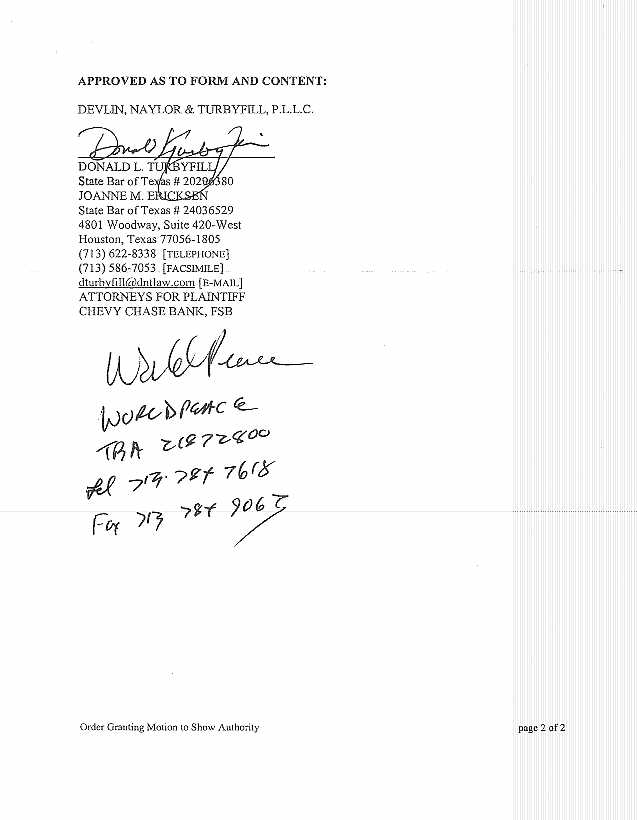
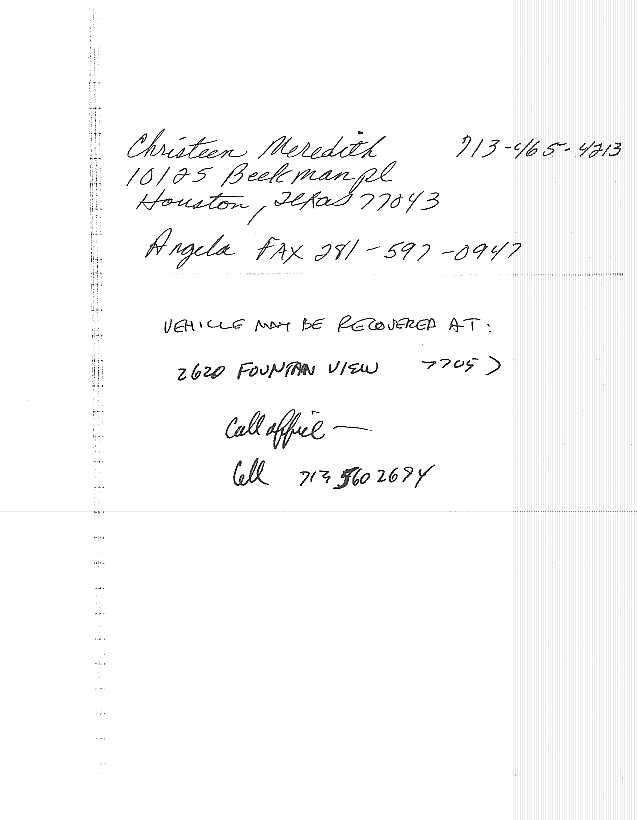
EXHIBIT
"B"
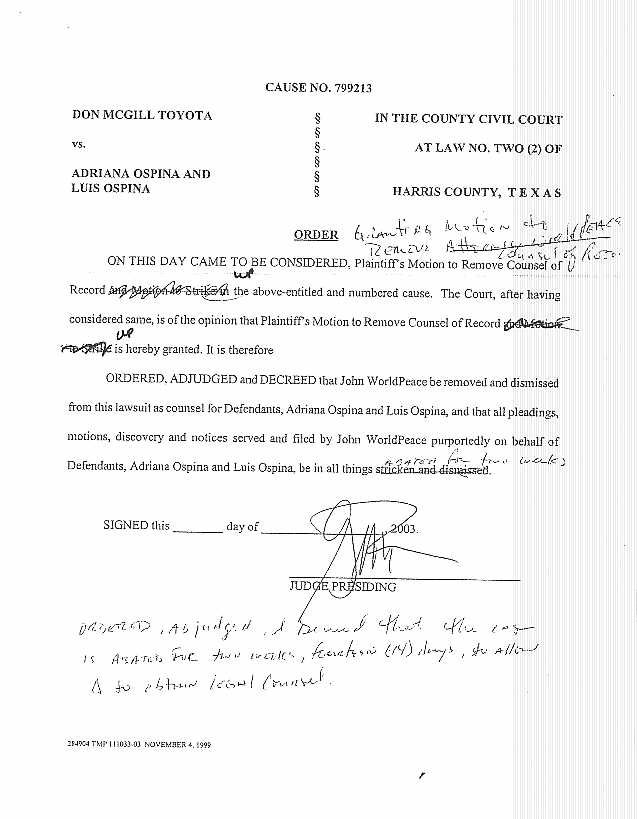
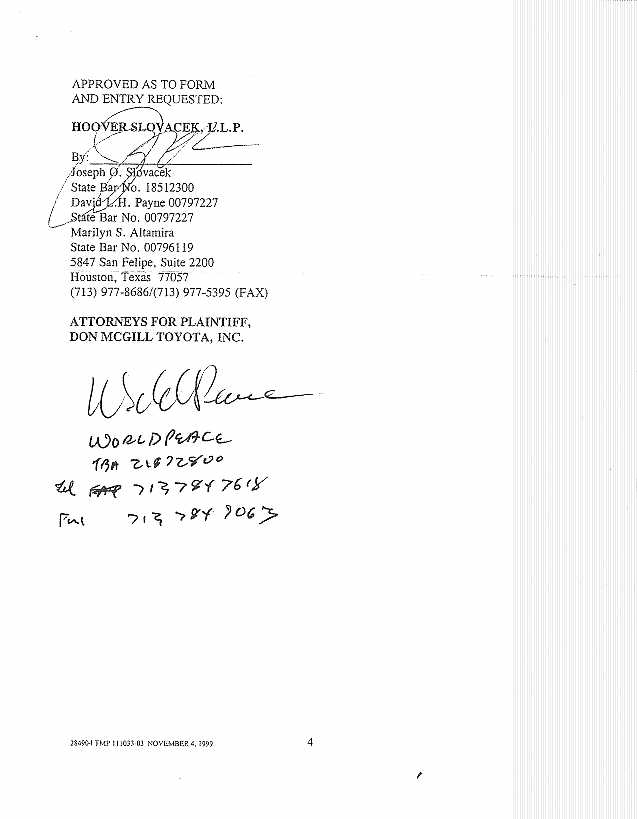
EXHIBIT "C"
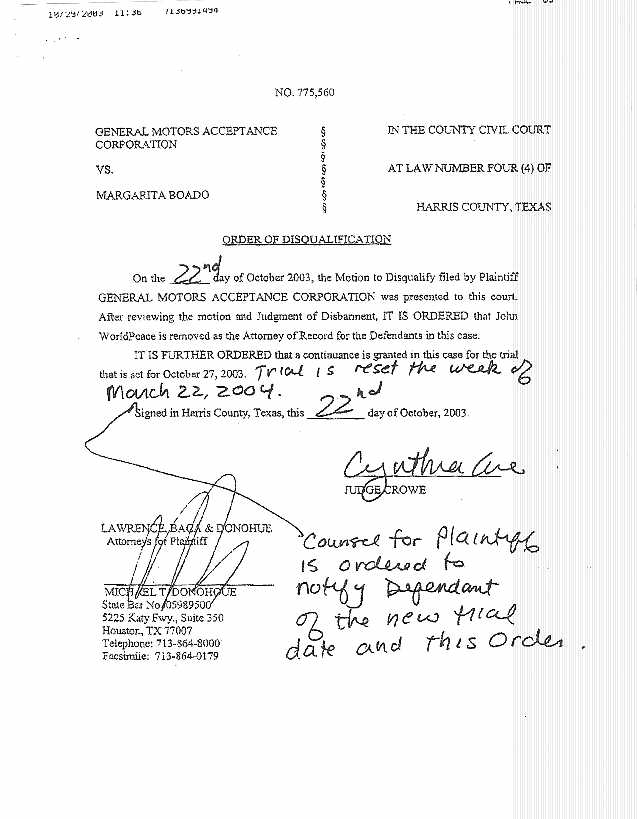
How can we manifest peace on earth if we do not include everyone (all races, all nations, all religions, both sexes) in our vision of Peace?
![[THE WORLDPEACE BANNER]](wpbanner.gif)
![[THE WORLDPEACE SIGN]](wppin.gif)
![[THE WORLDPEACE SIGN]](pinquarter.jpg)
The WorldPeace
Insignia
: Explanation
To order a WorldPeace Insignia lapel pin, go to: Order
To the John WorldPeace Galleries Page
To the WorldPeace Peace Page